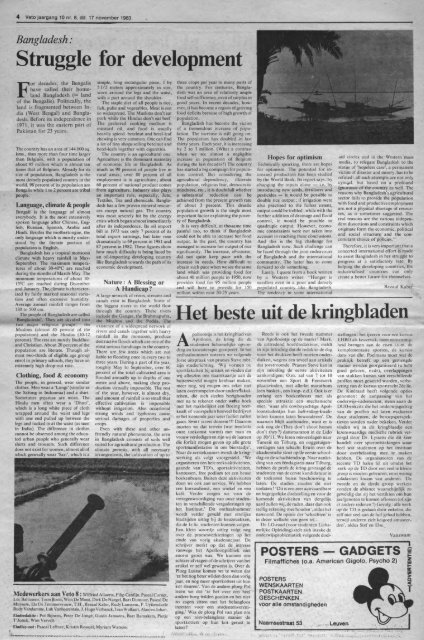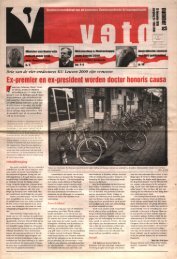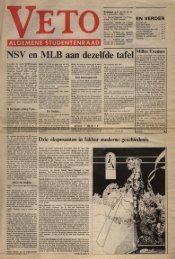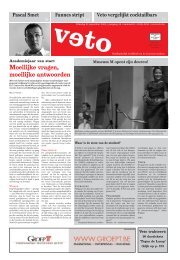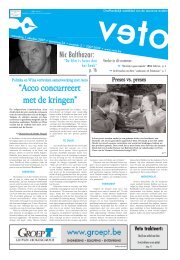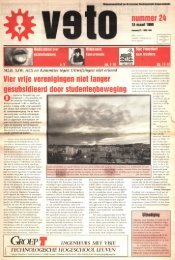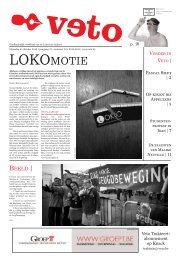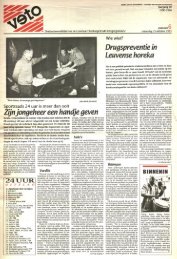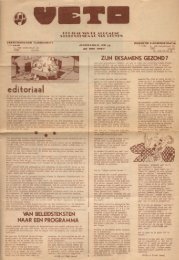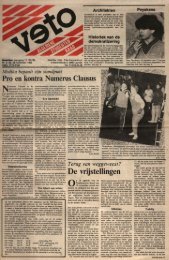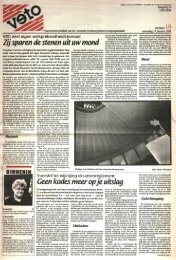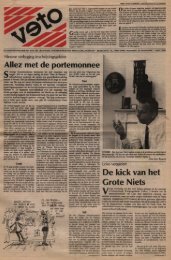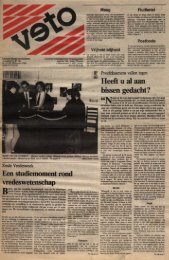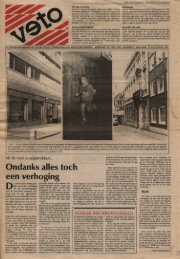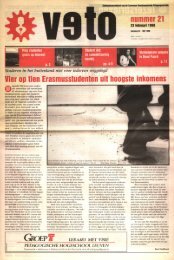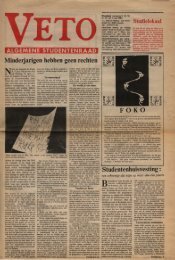You also want an ePaper? Increase the reach of your titles
YUMPU automatically turns print PDFs into web optimized ePapers that Google loves.
4. <strong>Veto</strong> jaargang 10 nr. 8, dd. 17 november 1983 ...<br />
Bangladesh:<br />
Struggle for development<br />
F<br />
or decades, the Bengalis<br />
have called their homeland<br />
Bangladesh (= land<br />
of the Bengalis). Politically, the<br />
land is fragmented between India<br />
(West Bengal) and Bangladesh.<br />
Before its independenee in<br />
1971, it was the eastern part of<br />
Pakistan for 23 years.<br />
The country has an area of 144.000 sq.<br />
kms., thus ~.ore than four time larger<br />
than Belgium, with a population of<br />
about 95 million which is al most ten<br />
times that of Belgium. Already for its<br />
size of population, Bangladesh is the<br />
most densely populated country in tbe<br />
world. 98 percent of its population are<br />
Bengalis while I to 2 percent are tri bal<br />
people.<br />
Language, elimate & people<br />
Bengali is the language of almost<br />
everybody. It is the most extensively<br />
spoken language after Chinese, English,<br />
Russian, Spanish, Arabic and<br />
Hindi. Besides the mothertongue, the<br />
only language which is mostly understood<br />
by the literate portion of<br />
populatien-is English.<br />
Bangladesh has a tropical monsoon<br />
c1imate with heavy rainfall in May-<br />
September. The maximum temperatures<br />
of about 30-400C are reached<br />
during the months ofMarch-May. The<br />
minimum temperatures of about lO-<br />
15°C are reached during December<br />
and January. The.clirnate is characterized<br />
by fairly marked seasonal variation<br />
and of ten excessive humidity.<br />
Average annual rainfall ranges from<br />
ISO to 500 cm.<br />
The people of Bangladesh are ca lied<br />
'Bangladeshi'. They are divided into<br />
two major religious groups: the<br />
Mus/ims (a/most 85 percent of the<br />
popu/ation) and the Hindus (10-12<br />
percent). The rest are m6stly Buddhist<br />
and Christian. About 20 percent ofthe<br />
population are literate. Though almost<br />
two-thirds of eligible age group<br />
enrol in primary schools, they have an<br />
extremely high drop-out rate.<br />
Clothing, food & economy<br />
The people, in general, wear similar<br />
c1othes. Men wear a 'Lungi' (similar as<br />
the Satong in Indonesia) and a shirt.<br />
Sometimes pyjamas are worn. The<br />
Hindu men of ten wear a 'Dhuti',<br />
which Is a long white piece of cloth<br />
wrapped around the waist and legs<br />
with one end pulled up between the<br />
legs and tucked in at the waist (as seen<br />
in India). The difference in clothes<br />
cannot be observed among the educated<br />
urban people who generally wear<br />
shirts and trousers. Such difference<br />
does not exist for women, almost all of<br />
which gene rally wear 'Sari', which is a<br />
simpie, long rectangular piece, I by<br />
5 1/2 meters approximately in size,<br />
worn around the legs and the waist,<br />
with a part around the shoulder.<br />
The staple diet of all people is rice,<br />
fish, pulse and vegetables. Meat is not<br />
so widespread. The Muslims don't eat<br />
pork while the Hindus don't eat beef<br />
The preferred cooking medium is<br />
mustard oil, and food is usually<br />
heavily spiced. betelnut and betel-leaf<br />
chewing is very common. One can find<br />
a lot of tiny shops selling betelnut and<br />
berel-leafs together with cigarettes.<br />
The country is an agricultural one.<br />
Agriculture is the dominant mainstay<br />
of economie life in Bangladesh. As<br />
much as 90 percent of people live in<br />
rural areas; over 80 percent of all<br />
employment is in agriculture; about<br />
60 percent of national product comes<br />
from agriculture. Industry also plays<br />
an important role, especially," Jute,<br />
Textiles, Tea and chemicais. Bangladesh<br />
has a few proven mine ral resources<br />
except natural gas. The country<br />
was most. severely hit by the energy<br />
crisis which began almost immediately<br />
af ter its independence. lts oil import<br />
bill in 1973 was only 7 percent of its<br />
total export earnings, but later rose<br />
dramatically to 69 percent in 1981 and<br />
87 percent in 1982. These figures show<br />
how much difficulty is being faced by<br />
an oil-importing developing country<br />
like Bangladesh towards the path of its<br />
economie development. .<br />
Nature: A Blessing or<br />
A Handicap?<br />
A large network of rivers, streams and<br />
canals exist in Bangladesh. Some of<br />
the biggest rivers in the world flow<br />
through the country. These rivers<br />
include the Ganges, the Brahrnaputra,<br />
the Meghna and the Podda. The<br />
existence of a widespread network of<br />
rivers and canals together with heavy<br />
rainfall in the monsoon, produce<br />
destructive floods which are one ofthe<br />
most serious handicaps in the country.<br />
There are few areas which are not<br />
liable to flooding once in every two to<br />
three years. During a part of the year,<br />
roughly May to September, over 60<br />
percent of the total cultivated area is<br />
flooded annually up to depths of one<br />
metre and above, making chop production<br />
virtually impossible. The rest<br />
of the year, however, is almost dry,<br />
and amount of rainfall is so small that<br />
effective cultivation is impossible<br />
without irrigation. Also occasional<br />
strong winds and typhoons cause<br />
serieus darnages of properties and<br />
crops.<br />
Even with these and other unfriendly<br />
natural phenomena, the area<br />
in Bangladesh consists of soils well<br />
suited for agricultural production. The<br />
c1imate permits, with all necessary<br />
arrangements, the cultivation of up to<br />
Medewerkers aan <strong>Veto</strong> 8 : Wilfried Allaerts, Filip Canfijn, Pascal Cornet,<br />
Luc Baltussen, Toon Boon, Wim De Mont, Dirk De Naegel, Bart Domoor, Pascal De<br />
Muysere, Els De Temmervrouw, T.H., Rezaul Kabir, Rudy Lanssens, F. Uyttendaele<br />
Rudy Vandamme, Luk Vanheerentals,J. Hugo Verbanck, I<strong>van</strong> Wulfaert, Alain en Johan.<br />
Eindredaktie: Pol Bijnens, Peter De Jonge, Guido Janssens, Bart Ramakers, Pietje<br />
T'Jonck, Wim Vervelt.<br />
Eindlay-out: Pascal Lefevre, Kristin Rosseel, Myriam Warson.<br />
three crops per year in many parts of<br />
the country. For centuries, Bangladesh<br />
was an area of relatively ample<br />
food self-sufficiency, even of surplus in<br />
good years. In recent decades, however,<br />
it has become a region ofgroving<br />
food deficits because ofhigh growth of<br />
. population.<br />
Bangladesh has -becorne the victim<br />
of a tremendous increase of population.<br />
The increase is still going on.<br />
The population has doubled in last<br />
thirty years. Each year, it is increasing<br />
by 2 to 3 million. (What a contrast<br />
when we see almost a negligible<br />
increase in population of Belgium<br />
during the last decades!) The country<br />
has started a big compaign for population<br />
control. But considering the<br />
agricultural dependency, illiterate<br />
population, religious fear, demoeratic<br />
mindness, etc., it is doubtfull whether<br />
a substantial reduction can be<br />
achieved frorn the present growth rate<br />
of about 3 percent. This drastic<br />
population growth is the single most<br />
important factor explaining the poverty<br />
of Bangladesh.<br />
It is very difficult, at thessame time<br />
painful too, to think if Bangladesh<br />
could not be able to increase her food<br />
output. In the past, the country has<br />
managed to increase her output of rice<br />
significantly. The increase, of-course,<br />
did not quite keep pace with the<br />
increase in needs. How difficult to<br />
obtain such pace when we see the same<br />
land which was providing food for<br />
about 40 million people in 1950, now<br />
provides food for 95 million people<br />
and will have to provide for 150<br />
million within next 20-25 years.<br />
Hopes for optimism<br />
Technically speaking, there are hopes<br />
for optimism. The potential for increased<br />
production has been studied<br />
by the World Bank. lts report says: by<br />
changing the inputs alone - i.e. by<br />
introducing new seeds, fertilisers and<br />
pesticides - it would be possible to<br />
double rice output; if irrigation were<br />
also practised to the fullest extent,<br />
output could be trebled ; while with the<br />
further addition of drainage and flood<br />
con trol, it would be possible to<br />
. quadruple output. However, economic<br />
contstraints were not taken into<br />
account in reaching these conclusions,<br />
And this is the big challenge for<br />
Bangladesh now. Such challenge can<br />
be faced through the joint endeavours<br />
of Bangladesh and the international<br />
comrnunity. The latter has to come<br />
forward to do something.<br />
Lastly, I quote from a book written<br />
by a Western writer. "Hunger is<br />
needless even in a poor and densely<br />
populated country like Bangladesh.<br />
The tendency in some international<br />
aid circles and in the Western "mass<br />
media, to relegate Bangladesh to the<br />
status of 'hopeless case', a permanent<br />
victim of disaster and rnisery, has to be<br />
refuted; all such attempts are not only<br />
cyniçal, but based on a profound<br />
ignorance .01' the country as weil. The<br />
reasons why Bangladesh's agricultural<br />
sector fails to provide the population<br />
with food and productive employment<br />
are. not a physical shortage of resources,<br />
as is sometimes suggested. The<br />
real reasons are the various independent<br />
distortions and constraints which<br />
originate form the economie, politica I<br />
and' social structure and the concomitant<br />
choice of policies."<br />
Therefore, it is very-irnportant that a<br />
concerted international effort is made<br />
to assist Bangladesh in her struggle to<br />
progress . at a satisfactory rate. By<br />
helping the developing countries, the<br />
industrialised countries can only<br />
create a better future for themselves.<br />
Rezaul Kabir<br />
Het beste uit de kringbladen<br />
A<br />
Polloontje is het kringblad <strong>van</strong><br />
Apolloon, de kring die de<br />
studenten lichamelijke opvoe-<br />
ding en kinesiterapie groepeert. In het<br />
onthaal nummer noteren we volgende<br />
forse uitspraak <strong>van</strong> praeses Steve mbt.<br />
zijn studierichting. 'Wij vormen !JE<br />
sportfakulteit bij uitstek en vinden dat<br />
wij alleszins ons naamkaartje aan de<br />
buitenwereld mogen kenbaar maken,<br />
meer nog, wij mogen ons zeker niet<br />
laten overrompelen door anderefakulteiten,<br />
die zich slechts bezighouden<br />
met na te rekenen onder we+ke hoek<br />
met het makkelijkst een Boeing neerknalt<br />
of voorspellen hoeveel bedrijven<br />
er het komende jaar weer failliet zullen<br />
gaan. SPORT is oxs domein !!! Daarom<br />
moeten we dat terrein (wat tenslotte<br />
onze toekomst vormt) met man en<br />
vrouw verdedigen en zijn wij de laatsen<br />
die forfait mogen geven op alle grote<br />
sportmanifestaties in ons bierstadje'.<br />
Naar de eerstekanners wordt de kringwerking<br />
als volgt voorgesteld. 'We<br />
organiseren een hele reeks aktiviteiten,<br />
gaande <strong>van</strong> TD's, sportaktiviteiten,<br />
kantussen, free podium tot een heuse<br />
boekenbeurs. Buiten deze aktiviteiten<br />
doen we ook aan service. We hebben<br />
een kursusdienst, een winkel en een<br />
kafé. Verder zorgen we voor devertegenwoordiging<br />
<strong>van</strong> onze studenten<br />
in verschillende vergaderingen op<br />
het Instituut.' Dit onthaalnummer<br />
wordt verder gevuld met ettelijke<br />
bladzijden uitleg bij de keuzevakken,<br />
die de Ie lic. studenten kunnen volgen.<br />
Een klein woordje uitleg volgt nog<br />
over de praesesverkiezingen op het<br />
einde <strong>van</strong> vorig akademiejaar. De<br />
schrijver merkt op dat de intresse<br />
<strong>van</strong>wege het Apolloonpubliek niet<br />
enorm groot was. We kunnen ons<br />
echtere afvragen of de schrijver <strong>van</strong> het<br />
artikel er zelf wel geweest is. Over de<br />
Ploeg Lustse komen we te weten dat<br />
'ze het nog beter wilden doen dan vorig<br />
jaar, en nog meer sportkotters uit hun<br />
kot sleuren'. Van de andere ploeg Pol<br />
lezen we dat 'ze het over een heel<br />
andere boeg wilden gooien en het niet<br />
zo zagen zitten met het belangloos<br />
inzetten voor een studentenvereniging.'<br />
Was de ploeg Pol <strong>van</strong> plan om<br />
op een niet-belangloze manier de<br />
sportkotters op hun kot gerust te<br />
laten?<br />
I a" ~j'. ,_)•.",.','..I_.' : .. ~\)' t', ,<br />
Reeds is ook het tweede nummer<br />
<strong>van</strong> Apolloontje op de markt! Mark,<br />
de uittredend hoofdredakteur. meldt<br />
in zijn inleiding dat de redaktie de dag<br />
voor het drukken heeft moeten onder-.<br />
duiken, wegens een teveel aan artikels<br />
dat toestroomde. Praeses Steve kan in<br />
zijn inleiding de eerste aktiviteiten<br />
aankondigen. O.m. zal <strong>van</strong> ~ tot 10<br />
november een Sport & Feestweek<br />
plaatsvinden, met allerlei marathons<br />
(een basket-, een loop- e.d.). Ook is er<br />
eerlang een boekenbeurs met als<br />
speciale attraktie een mechanische'<br />
stier, 'waar alle cowboyachtige Apolloonstudentjes<br />
hun bull-riding-kwaliteiten<br />
kunnen laten bewonderen'. De<br />
waanzin blijft aanhouden, want er is<br />
ook nog de (They don't shoot horses<br />
don 't they?) dansmaraton in de Lido<br />
op 10/1 I. We lezen reisverslagen naar<br />
Tunesië en Tilburg, en ooggetuigenverslagen<br />
<strong>van</strong> schacht Erwin over de<br />
akademische stoet op "de eerste schooldag<br />
en de schachtendoop. Naar aanleiding<br />
<strong>van</strong> een ééndagsreis naar Tilburg,<br />
hebben de profs de kring gevraagd de<br />
studenten <strong>van</strong> de eerste kandidatuur in<br />
de toekomst buien beschouwing te<br />
laten. De studies zouden dit niet<br />
toelaten! 'Dit is een zeer aanvaardbare<br />
en begrijpelijke doelstelling en voor de<br />
komende aktiviteiten <strong>van</strong> dergelije<br />
aard zullen wij, de raden, daar dan ook<br />
stellig rekening mee houden', aldus het<br />
nawoord. De opinie der 'schachten' is<br />
in dezer wellicht <strong>van</strong> geen tel. ..<br />
De LO-raad (voor studenten Lichamelijke<br />
Opleiding) stelt zich inzake de<br />
onderwijsproblematiek volgende doel-<br />
stellingen: het ijveren voor een kursus<br />
EHBO als keuzevak, meer eenvormigheid<br />
brengen aan de eisen i.v.m. de<br />
komplementaire sporten, de kursus<br />
dans <strong>van</strong> dhr. Poelmans moet wat de<br />
praktijk betreft op een gemengde<br />
manier worden georganiseerd (u hebt<br />
goed gelezen, nvdr), overlappingen<br />
<strong>van</strong> stukken kursus <strong>van</strong> verschillende<br />
proffen moet geweerd worden, verbetering<br />
<strong>van</strong> de kursus sportrecht 2de lic.<br />
De Kinéraad heeft VOlgende opties<br />
genomen: de aanpassing <strong>van</strong> het<br />
onderwijs-vademecum, steun aaan de<br />
OUO-enkeite die het onderwijsgedrag<br />
<strong>van</strong> de proffen wil laten evalueren<br />
door studenten, de beroepsperspektieven<br />
worden nader bekeken. Verder<br />
vinden wij in dit kringblaadje een<br />
lezenswaardige medische rubriek verzorgd<br />
door Or. Lyssens die dit keer<br />
handelt over spierontstekingen waar<br />
heel wat studenten op het instituut<br />
door overbelasting mee te maken<br />
hebben. De organisatoren <strong>van</strong> de<br />
recente TD halen fel uit omdat het<br />
verk op de TD door een veel te kleine<br />
groep is moeten gebeuren, en er weinig<br />
solsdariteit kwam <strong>van</strong> anderen. 'De<br />
tweede en de derde groep werkers<br />
vonden de abiance waarschijnlijk zo<br />
geweldig dat zij het vertikten om hun<br />
jaargenoten te komen aflossen (of zijn<br />
et andere redenen ?) Gevolg: alle werk<br />
op de TD_is gedaan door enkelen, die<br />
zelf niet veel aan de fuif gehad hebben,<br />
terwijl anderen zich keigoed amuseerden',<br />
aldus Stef en Else.,<br />
Vanzwam<br />
POSTERS'- GADGETS<br />
Filmaffiches (o.a. American Gigolo. Psych'o 2)<br />
POSTERS'·.<br />
WENSKAARTEN<br />
POSTKAARTEN<br />
GESCHENKÎ=N<br />
voor alle omstandigheden<br />
Naamses.traat 53<br />
-LU<br />
~ LU<br />
E >cCl:<br />
T


